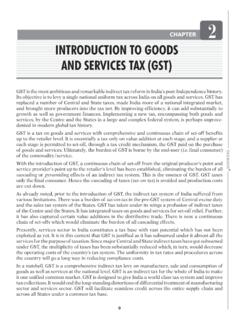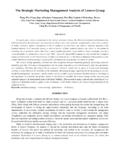Transcription of 4 STOCK VALUATION - FUNDAMENTAL ANALYSIS - Taxmann
1 4 STOCK VALUATION - FUNDAMENTAL ANALYSIS . chApter LEARNING OUTCOMES. After reading this chapter you will be able to understand FUNDAMENTAL ANALYSIS Highlight the importance of FUNDAMENTAL ANALYSIS Perform company ANALYSIS using financial and non-financial data understand various financial ratios and their utility Perform dupont ANALYSIS understand various STOCK VALUATION models Investors invest in a wide range of securities as available in financial markets. For the sake of simplicity these securities can be divided into two broad categories like fixed income securities bonds and debentures.
2 And variable income securities equity shares. In the previous chapter we discussed about fixed income securities bonds and debentures and provided VALUATION models for their pricing. The peculiar feature of bonds and debentures is that the cash inflows from these securities can be very well predicted in advance because they have a fixed rate of interest income. Further they are also redeemable at maturity. Fixed income securities are preferred by more risk averse investors who do not want to take high risk and who prefer regular income rather than capital appreciation.
3 Most of the old age and retired people fall in this category. However bonds and deben- tures may not interest to other investors who are less risk averse and prefer capital appreciation rather than regular income. Most of the young people and speculators fall in this category. For such investors equity shares are ideal investment option. It must be noted that investors generally invest in both bonds and equity shares as per their investment goals and investment horizon. This chapter deals with equity shares. 133. Para STOCK VALUATION - FUNDAMENTAL ANALYSIS 134.
4 Equity shares are fundamentally different from debt securities or bonds. Equity shares represent ownership right in a company but return on equity shares is not fixed. Income from equity shares varies depending upon the amount of dividend declared by the company, which in turn, depends upon company's profits besides a number of other factors. Equity sharehold- ers are the owners of the company and not its creditors. Equity shares of publicly held companies are mandatorily listed on STOCK exchanges, which in turn, provide a platform for purchase and sale of equity shares.
5 Hence equity shares are more liquid than bonds. The market price of a share rep- resents shareholder's wealth and hence the market value of a company. Share prices move according to the information available in the market. Expectations also play a major role in share price movement. A positive information or expectation will increase market price of a share while a negative information or expectation will dampen it. For example market price of a company which has shown higher growth in profitability increases while for a company, which is in distress, the market price declines.
6 Approaches to Security ANALYSIS Behaviour of STOCK prices is an important area of research in finance. A. plethora of research studies have shown share price movements for devel- oped as well as developing countries since the decade of 1960's. The STOCK market provides the market price of a share or What the price is . It is the price at which a share can be bought or sold. However a prospective investor as well as an existing shareholder is interested more in knowing What the price should be or what is the real worth of a share. So that a buy' or sell' decision can be made.
7 In a bid to answer this question and predict share price, the following three approaches to security VALUATION have evolved over the years. 1. FUNDAMENTAL ANALYSIS : It is based on the premise that in the long run true or fair value of an equity share is equal to its intrinsic val- ue. The intrinsic value of a share is the present value of all future expected cash inflows from the share. If the intrinsic value is greater than current price of the share, the share is underpriced and hence a good buy. On the other hand, if intrinsic value is less than current price of the share, it is over priced and hence a good sell'.
8 The fu- ture expected cash inflows from a share depends upon a wide array of factors including company's performance and future prospects. FUNDAMENTAL ANALYSIS is used primarily to identify securities that are mispriced that are undervalued or overvalued. However FUNDAMENTAL analyst needs to be equipped with certain financial and statistical skills in order to perform it. FUNDAMENTAL ANALYSIS , especially company ANALYSIS is dealt in detail in this chapter. 135 FUNDAMENTAL ANALYSIS Para 2. Technical ANALYSIS : Technical ANALYSIS is based on the premise that history repeats itself'.
9 Hence future price movements can be well pre- dicted on the basis of past price and volume data. Technical analysts are therefore called chartists because they study various charts and patterns to predict What the price should be . Technical ANALYSIS is done on the basis of trend ANALYSIS of past prices. Technical ANALYSIS is used primarily to time the market in identifying the right time to buy or sell. It must be noted that technical ANALYSIS predicts future prices over a short period of time and hence may not be useful for a long term investor who just want to buy and hold the securities.
10 Technical ANALYSIS is dealt in detail in next chapter. 3. Efficient Market Hypothesis (EMH) : The proponents of EMH, led by Eugene Fama in 1970, believe that share prices at any time reflect their true intrinsic value and hence all available information is already reflected in market price of a share. It is the flow of new information which changes share price. FUNDAMENTAL ANALYSIS . FUNDAMENTAL ANALYSIS is based on the premise that in the long run true or fair value of an equity share is equal to its intrinsic value. The intrinsic value of an asset is the present value of all expected future cash inflows (or earnings) from that asset.














